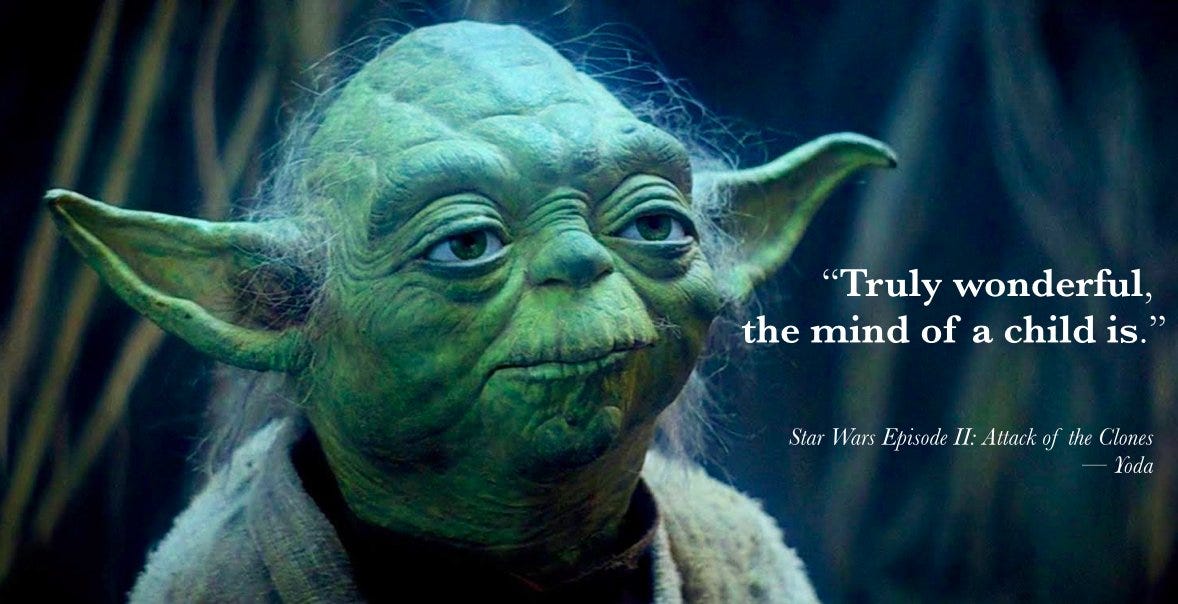Welcome to the sixteenth edition of Small Talks. Every Friday, I highlight 6 areas of weekly joys and reflections in early childhood and the whole family. Small Talks leverages my experience at the intersection of education, philanthropy and impact investing. Enjoy!
What I’m celebrating —
“The more you learn about the science of early childhood, the more you realize that this is the social equivalent to climate change, but it is not discussed with the same seriousness or strategic intent than that issue is.”
“The early years are not simply about how we raise our children. They are about the society we will become.”
What I’m listening to —
I had the pleasure of joining the Co-Generate event led by encore.org about co-creation across generations, with an inspiring line-up or artists, visionaries, policy makers and innovators. Really interesting to hear about the rising societal longing for inter-generational approaches.
Beautiful talk “Imagination is a Creative Superpower” by Ashley Ford.
What I’m reading —
Chip Conley’s book Wisdom at Work: The Making of a Modern Elder is filled with wisdoms on (1) people living longer - 30 years longer than in 1900; (2) power moving younger - by 2025, more than 50% of workers will have a younger boss; (3) “crystallized intelligence” that comes from growing ‘whole’ vs. ‘old”. Chip Conley coined the term “modern elder” when he jointed Airbnb at 52 as a strategic adviser and was twice the age of the average employee there.
What I’m watching —
How Early Childhood Experiences Affect Lifelong Health and Learning by the Harvard Center on the Developing Child.
If you need a boost of inspiration, I recommend The Antidote documentary about acts of kindness.
What I’m learning and exploring more deeply —
Latest report from Dr. Phil Fisher and his team at the University of Oregon from rapid survey of families with young children suggests rising debt in families, linked to emotional distress.
Is Education No Longer The “Great Equalizer”? - Brainy piece by Thomas Edsall shows that education lifts all boats, but not equally. He recommends investments in early childhood, parenting and non-cognitive competencies.
Erin Lynn Raab writes about how do we prepare students to flourish in a in VUCA(H) future. My favorite quote:
“If we want students to be prepared to flourish in an unpredictable future, we shouldn’t be focused on the future at all; we should be focused on securing they flourish now.”
Excellent reporting by Mark Swartz at EarlyNation on “Minnesota education scholarships” supporting low-income families with access to quality early childhood, with meaningful impact.
This piece about playgrounds that rip safety rules made me think and question my own parenting style: the trade-offs between safety and over-protecting /over-parenting children. Check out the pictures.
McKinsey’s Economic State of Black America: what is and what could be. The median annual wage for Black workers is 30%, or $10,000, lower than white workers— with enormous implications for economic security, consumption, and wealth. Black workers make up 12.9% of the US labor force but earn only 9.6% of wages.
The career-jump tsunami: 53% of American workers say they want jobs in new industries — but the biggest barrier? Reskilling.
Quote I am pondering —
“Another world is not only possible, she is on her way. On a quiet day, I can hear her breathing.”
—Arundhati Roy
Feedback is a gift. Which part above is your favorite? What did I miss? What do you want more or less of? Other recommendations? Please kindly let me know. Thank to all all of you who are sending me amazing suggestions.
If you enjoy this newsletter, please help spread the word by sharing with your friends, colleagues, and networks.
Have a wonderful week. Please stay safe and care for each other.
Isabelle




